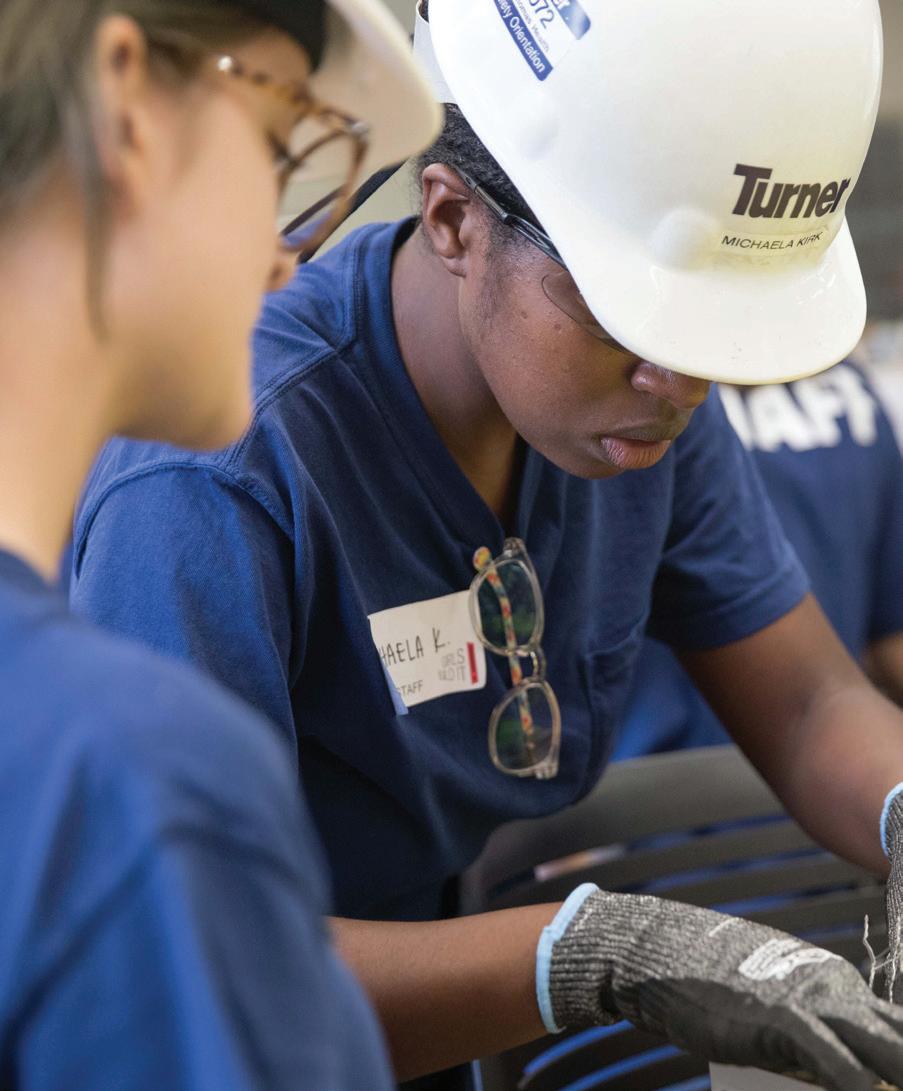
11 minute read
PAVING THE WAY FOR WOMEN
ALUMNAE ARE LEADING WOMEN TO ENTER MALE-DOMINATED CAREERS NATIONWIDE
By Janel Shoun-Smith and Anna Moseley
CONSTRUCTION. COMPUTATION. COMPUTERS.
Think of these three areas, and you are probably envisioning men. Three women of Lipscomb are taking steps to change that.
Michaela Kirk. Maura Cunningham. Marla Lamont. One graduate of the Raymond B. Jones College of Engineering banding together with her female co-workers to hold a summer camp for girls to learn the basics of construction and engineering.
One graduate of the Nelson & Sue Andrews Institute of Civic Leadership creating an enrichment course on financial services that is now reaching out to girls across the nation. One graduate of the College of Business putting her leadership skills to work in a Nashville association mentoring and raising money for young girls who want to enter technology fields.
These women are crafting a future where women will not just survive in these career fields.
They will thrive, and they will lead.
Trading high fashion for a hard hat to put her engineering degree to work in construction
Lipscomb alumna Michaela Kirk (’15) is paving the way for women in construction one project at a time.
Kirk, a business development engineer at Turner Construction, the number one health care construction manager in Nashville, is not only finding success in a male-dominated field, but she is also paving the way for future women to enter engineering and construction with Girls Build It, a two-day camp to introduce girls to the industry.
Although she fell in love with the profession during her junior year at Lipscomb, construction was never on Kirk’s radar before college. For as long as she can remember, Kirk had a dream of moving to New York and becoming a fashion designer.
“My mom was a model in the 70s, and that really sparked my love for the fashion industry,” said Kirk. “During my senior year, my mom told me she didn’t want me to follow in her footsteps because the fashion industry is a cutthroat one. I thought to myself, ‘I am 18, about to decide on a college, and you’re telling me that I shouldn’t do the only thing I’ve ever wanted to do?’”
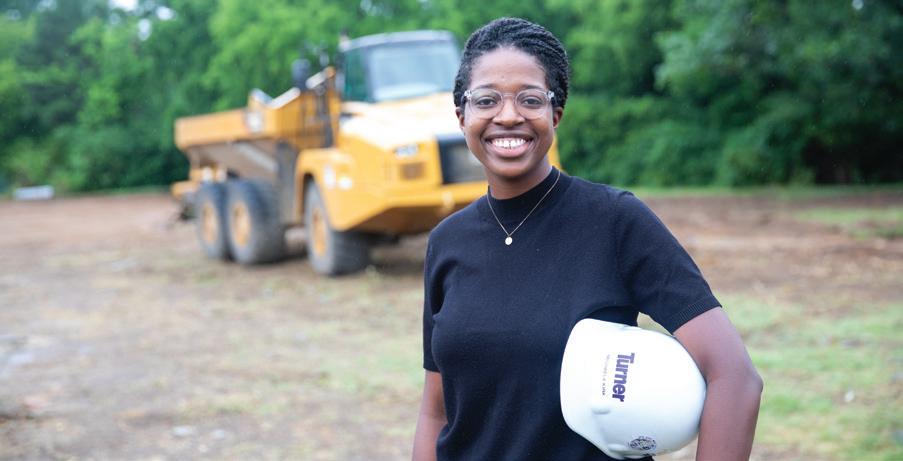
Michaela Kirk (''15)
Photo by Kristi Jones
Kirk decided that if she couldn’t design clothing, she would design buildings. Her plan was to major in engineering at Lipscomb and then pursue a graduate degree in architecture. It didn’t take long for Kirk to find her niche as an innovator and leader in the engineering department. In 2015, she served as the project manager on Lipscomb’s first concrete canoe team.
“As the project manager, I assisted my teammates with the research. Our team went to several competitions just to learn best practices from teams that were already competing,” said Kirk.
She worked with four students from her civil engineering class on the project, and today students in the engineering department still compete every year in an attempt to create an 18-foot-long canoe that will hold up to four people (650 pounds), while weighing about 700 pounds itself.
Kirk discovered her passion for construction in her junior year after hearing professionals at a symposium discuss future construction plans for the Greater Nashville area.
“It was a construction symposium focusing on health care. I went and I fell in love with it. There were architects, engineers and civic designers, all talking about what is on the forefront of design in Nashville,” she said.
Once she graduated from Lipscomb, Kirk veered from the architecture path and instead went straight into Vanderbilt’s construction management program. Because most of her classes were at night, Kirk was able to work full time in an internship at Turner.
That internship turned into a career when she was hired on after graduation as an assistant engineer. She now serves as Turner’s business development engineer.
“My position is unique in that I get to work with all of Turner’s offices,” said Kirk. “We have offices in Nashville, Memphis and Huntsville. Any project that we pursue at Turner, I get to touch.”
Kirk is also using her role at Turner to serve as a role model for young women interested in engineering and construction careers. Along with other female professionals at Turner, she has established a free two-day camp called Girls Build It.
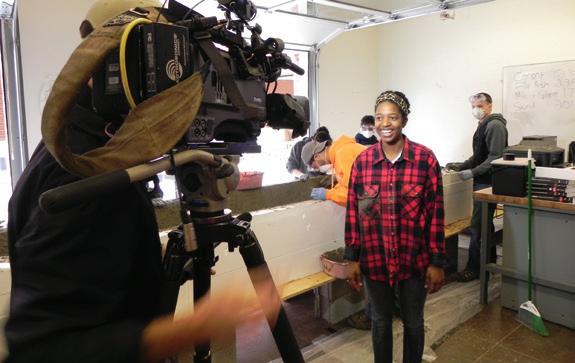
Engineering graduate Michaela Kirk helped lead Lipscomb's first concrete canoe competition as a student and was featured in the Nashville media.
Photo by Kristi Jones
“The idea for Girls Build It came from our human resources manager at Turner,” said Kirk. “A company she previously worked for in California had a similar camp. and she suggested we lead one here in Nashville. Since our paths to construction were all interesting, she thought we could be examples to these girls that construction is a viable option for them too.”
The team began planning in August of 2017 and the camp officially started in June of 2018, held on the Lipscomb campus. Campers participated in hands-on sessions led by the women from Turner. From visiting landmark construction projects to building concrete lamps, campers got a view of trades, construction and engineering fields.
“This camp is a great way to show high school girls that they can use power tools and wire a concrete lamp, and they can have fun doing it, too,” said Kirk. “When I was in high school, I had no idea construction was even a possibility for me, so being able to show them that it is an option, and that they are capable, is exciting.”
“My advice to other girls is that the worst people can tell you is no, so it doesn’t hurt to try out anything and everything that interests you,” says the woman who wears a hard hat but is still the style maven for her family and friends. “Don’t limit yourself to one area and don’t let others tell you what career path you should take.”
Rocking Wall Street with a new generation of financially skilled women
Maura Cunningham (MACL, ’12) believes math can be used for even more than scientific achievements or computing marvels. It can also be used to empower women.
“In the U.S., we start to lose girls in math at age nine,” said Cunningham, a former financial professional who now runs a nationwide nonprofit, Rock The Street, Wall Street.
“As they age, girls report significantly lower confidence in math, despite earning equal scores to boys. Eighty percent of teachers self-report that they are not competent teaching financial literacy. “So it’s no wonder that two out of three women state they know little to nothing about finance or financial products,” said Cunningham.

Maura Cunningham ('12)
Submitted Photo
That’s where Rock the Street, Wall Street comes in. The academic, year-long, financial literacy program established by Cunningham in 2013 is designed to spark the interest of high school girls in careers of finance.
“Exposing high school girls to the creative and practical sides of math—such as stock market investing—can influence their career choices and empower them to make better decisions about money,” she said.
As a 25-year finance industry veteran, she knows that women often hesitate to pursue careers in traditionally maledominated occupations because they don’t believe they have the skills or confidence to be successful.
“I was often the only female producer in my office. I looked around me and realized the lack of females in my field was a result of financial topics not being taught in schools along with the absence of female leaders and role models for young women to emulate,” said Cunningham.
The native New Yorker worked in real estate syndication, unit investment trusts and taxable fixed income capital markets as well as built a successful practice advising high net-worth families on wealth management before powering down her trading computer about a decade ago to leave behind the bulls and bears of Wall Street to look for a new challenge in Nashville.
In 2011, Cunningham enrolled in the inaugural cohort of Lipscomb’s Nelson and Sue Andrews Institute for Civic Leadership.
A key component of the master’s program in civic leadership is a capstone project. With this assignment, Cunningham saw an opportunity to give life to her idea: an initiative to set more young women on a path to better understand finance and to pursue careers in the financial services industry.
In 2012, with degree in hand, Cunningham began the pilot stage for RTSWS at one local Nashville school.
The program introduces financial concepts such as savings, investments, budgets, stocks, bonds, and college and career financial preparedness. All of these topics are taught by female financial professionals. Today Rock The Street, Wall Street has served over 1,700 high school girls and is offered in 29 high schools across 16 U.S. cities.

Cunningham addresses girls in the Rock the Street, Wall Street program, a national enrichment program she initially developed while a graduate student in Lipscomb's Nelson & Sue Andrews Institute for Civic Leadership.
Photo by Rock the Street, Wall Street
These days Cunningham finds herself invited to White House conferences on STEM education, heading to speaking engagements at NASDAQ and accepting awards from the Women’s Bond Club, a 98-year-old organization in New York City that focuses on advancing women in finance. RTSWS has been featured in financial trade magazines and on local TV stations.
“We hope to break the cycle of multigenerational financial naiveté so that girls have a better chance at improving their lives, their communities and the financial services industry,” said Cunningham.
Using her business sense to bring more women to tech
Marla Lamont (MBA, ’15) began working in the telecomm industry at the start of the millennium, and at the time, she had no idea that she would someday be in part responsible for hundreds of young women making their own way into technology industries.
Lamont, now director of talent acquisition at HCA, has been president of Women in Technology Tennessee since October of 2017 and has worked tirelessly for at least five years before that in raising money for the almost $50,000 in college scholarships the organization awards to girls each year.
One of her can’t miss events each year is the Adventure Science Center’s TWISTER, a one-day conference for high school girls presented by women working in STEM careers. Lamont presents two scholarships to participants at TWISTER, which stands for Tennessee Women in Science, Technology, Engineering & Research.
“Getting to announce the winners of the scholarships to them at the actual event, just getting to see the look on their faces makes me feel really good about what I do and how I am affecting someone’s life,” said Lamont. “When you read the applications, see the challenges they have already overcome and understand how much they could achieve with the money, it makes me very passionate about it.”
Lamont first worked in the telecom industry beginning in 2000, but when she switched gears to move into IT recruiting in 2005, she became acutely aware of the lack of women in the IT industry and the lack of female candidates to fill IT spots.
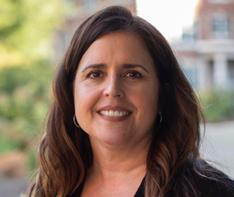
Marla Lamont ('15)
Photo by Kristi Jones
The realization inspired her to become part of WiTT in 2004. At that time, WiTT had only been established for six years and was primarily focused on networking and encouragement of members to overcome the struggles of a male-dominated field.
But the group started raising a little money for scholarships and now offers not only the scholarships but also an annual coding camp, programs within the schools, sponsorship of a girls’ robotics team at Merrol Hyde Magnet School and two mentorship programs at Lipscomb University and Middle Tennessee State University.
Lamont became more involved with WiTT, first being elected to the board, then becoming director of sponsorships, then vice president and now president until December 2019. She will continue to be heavily involved in WiTT activities as past president for the next two years.
This past winter, Lamont was excited to personally deliver a batch of the books Hidden Figures to Stratford STEM Lower School and to sponsor their participation in Engineering Day activities at Lipscomb when Hidden Figures’ author Margot Lee Shetterly spoke for the students.
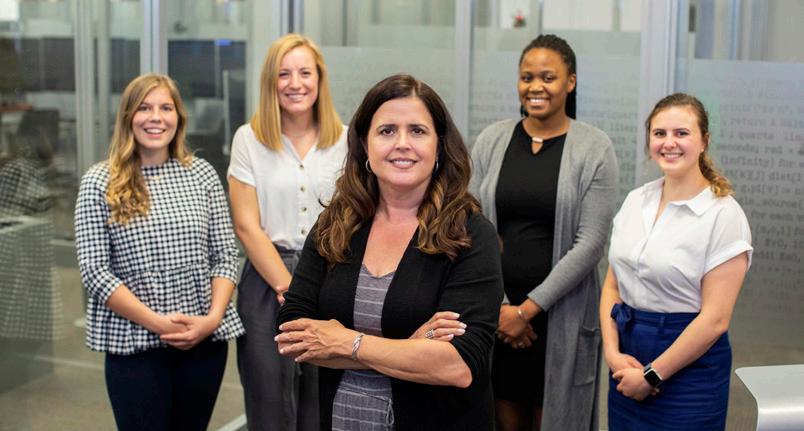
Lamont serves as president of Women in Technology Tennessee, an organization that helps mentor Lipscomb's female students in the College of Computing & Technology.
Photo by Kristi Jones
In 2018, The Nashville Technology Council awarded Lamont the Community Leader of the Year Award, which recognizes local leaders who are “making Nashville the destination for creative and innovative technology.”
“We want to revolutionize the experience of women in tech and establish a new standard of inclusion for tech culture and leadership,” said Lamont of WiTT. “It is so important to reach girls at a young age to get them interested in tech, and we are focusing on outreach programs for STEM initiatives and coding clubs, among other things, in the middle school and high school arenas.”
Diversity and collaboration sparks more innovation and quality performance, Lamont said, so it’s crucial that more women make their way into tech fields, which is still not happening in the numbers needed, she said.
The National Center for Women and Information Technology reports that in 2017, only 26 percent of the computing workforce were women, and the number of women earning degrees in computer science has been steadily decreasing since 1990. At the same time, by 2026, 3.5 million computing-related jobs are expected to exist. At the current rate, only 17 percent of these jobs could be filled by U.S. computing graduates, Lamont said.
“We need you as women to get computer science degrees and to get one of those 3.5 million jobs,” said Lamont. “Having the diversity of thought that a woman brings to a company can only be a good thing. The way women approach problems is different from a man, so having a different approach will only be an advantage.”









